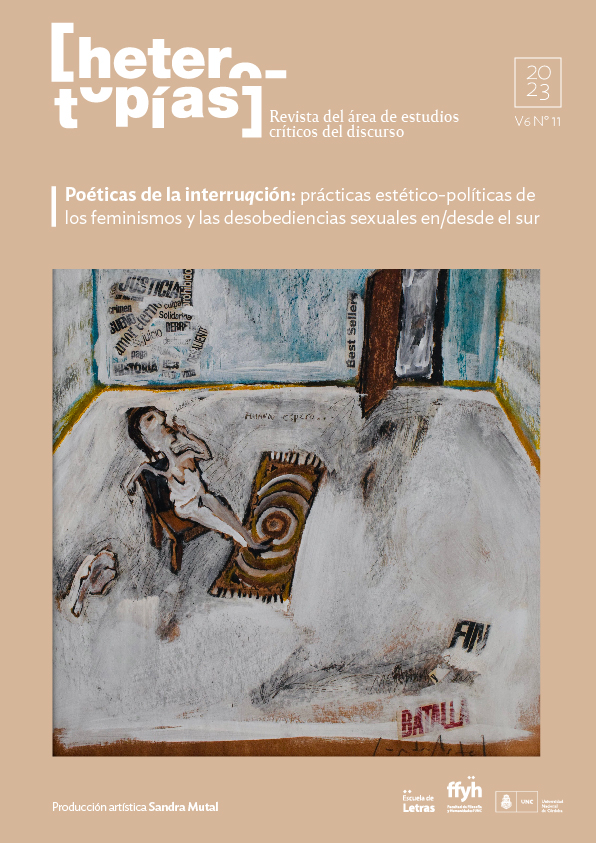"Will we be able to assemble a bag of dangerous ideas as a vortex of a storm to come? An interview with val flores
Main Article Content
Abstract
The thinking, the writing, and the actions of val flores –an independent researcher, writer, professor, sexual dissidence activist and performer– have served a significant part of the reflections on sex and gender over the last two decades. val flores’ research and ways of dislocating the non-communicating compartments between thinking-action and activism have become a vital contribution to our reflections that lay between words, images, teaching, comprehensive sex education (ESI) and sex-gender activism in and from South America.
Inquiring into theses intersections, Sandra Mutal, María Angélica Vega, and Laura Gutiérrez conducted a remote six-hands interview via e-mail that revolved around an alternative temporality. Against the idea that everything can and should be clairvoyance for our feminist and sex-dissident actions, val explores around a poetics of opacity as a subterranean strategy against the urgent imperatives of doing.
Downloads
Article Details

This work is licensed under a Creative Commons Attribution-NonCommercial-ShareAlike 4.0 International License.
Those authors who have publications with this journal, accept the following terms: Those authors who have publications with this journal, accept the following terms:
a. The authors will keep their copyright and guarantee to the journal the right of first publication of their work, which will be simultaneously subject to the Creative Commons Attribution - Non-Commercial - Share Alike (by-nc-sa) Attribution License; no commercial use of the original work or any derivative works is allowed, the distribution of which must be done with a license equal to the one that regulates the original work.
b. Authors may adopt other non-exclusive license agreements for the distribution of the published version of the work (e.g., deposit it in an institutional telematic archive or publish it in a monographic volume) provided that the initial publication in this journal is indicated.
c. Authors are allowed and recommended to disseminate their work through the Internet (e.g. in institutional telematic archives or on their website) before and during the submission process, which may lead to interesting exchanges and increase the number of citations of the published work. (See The effect of open access).
References
Aguilar Gil, Yásnaya (2021). “Resistencia. Una breve radiografía”, en La sangre, la lengua y el apellido. Buenos Aires: Madreselva.
Bardet, Marie (2019). “Hacer mundos con gestos”, en Haudricourt, A. El cultivo de los gestos. Buenos Aires: Cactus.
Bona, Dénètem Touam (2019). “Cosmopoética del refugio”.Traducción de Camino Villanueva.
Colectivo Ayllu (2018). Devuélvannos el oro. Cosmovisiones perversas y acciones anticoloniales. Madrid: Matadero Centro de Residencias Artísticas.
Dahbar, kolo/Victoria (2021). Otras figuraciones. Sobre la violencia y sus marcos temporales. Córdoba: Asentamiento Fernseh.
flores, val (2022a). Labiar el desierto. Buenos Aires: La Libre.
------------- (2022b). “Tiempos perdidos: el retroceso como atracción pedagógica”, en II Jornadas de Estudios sobre Pedagogías Cuir. Trans/disciplinas, In/disciplinas, y End/disciplinas. Organizadas por: Grupo de Investigaciones en Educación y Estudios Culturales (GIEEC)/ Grupo de Investigación en Filosofía de la Educación (GIFE) Centro de Investigaciones Multidisciplinarias en Educación (CIMED)/ Departamento de Ciencias de la Educación/ Facultad de Humanidades, UNMdP/ PedagOrgía: Grupo de Extensión Cuir. Teatro Auditorium. Mar del Plata, 19 agosto de 2022. Algunas huellas del taller se pueden encontrar en: http://escritoshereticos.blogspot.com/2022/09/tiempos-perdidos-el-retroceso-como.html
------------- (2021a). Romper el corazón del mundo. Modos fugitivos de hacer teoría. Madrid: Continta me tienes.
------------- (2021b) Lenguaraces del futuro, criando ruinas para nuestro caos visionario. S/D.
------------- (2017). Tropismos de la disidencia. Santiago de Chile: Palinodia.
Gutiérrez, Laura (2022). Imágenes de lo posible. Intervenciones y visibilidades lésbicas y feministas en Argentina (1986-2013). Córdoba: Asentamiento Fernseh.
Muñoz, José Esteban (2020). Utopía queer. El entonces y allí de la futuridad antinormativa. Buenos Aires: Caja Negra.
Wittig, Monique y Zeig, Sande (1981). Borrador para un diccionario de las amantes. Barcelona: Lumen.
Wittig, Monique (2005). “El lugar de la acción”, en El pensamiento heterosexual y otros ensayos. Madrid: Egales.
